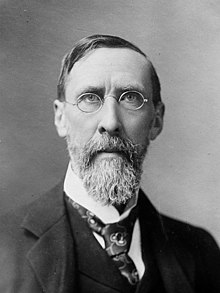Sir George Eulas Foster | |
|---|---|
 | |
| Minister of Trade and Commerce | |
| In office October 10, 1911 – September 21, 1921 | |
| Prime Minister | Robert Borden |
| Preceded by | Richard John Cartwright |
| Succeeded by | Henry Herbert Stevens |
| Minister of Finance | |
| In office May 29, 1888 – July 8, 1896 | |
| Prime Minister | John A. Macdonald |
| Preceded by | Charles Tupper |
| Succeeded by | William Stevens Fielding |
| Minister of Marine and Fisheries | |
| In office December 10, 1885 – May 28, 1888 | |
| Prime Minister | John A. Macdonald |
| Preceded by | Archibald McLelan |
| Succeeded by | Charles Hibbert Tupper |
| Senator for Ontario | |
| In office September 22, 1921 – December 30, 1931 | |
| Nominated by | Arthur Meighen |
| Appointed by | The Lord Byng of Vimy |
| Member of Parliament for Toronto North | |
| In office January 11, 1905 – September 22, 1921 | |
| Preceded by | District created in 1903 |
| Succeeded by | Thomas Langton Church |
| Member of Parliament for York | |
| In office August 19, 1896 – February 6, 1901 | |
| Preceded by | Thomas Temple |
| Succeeded by | Alexander Gibson |
| Member of Parliament for King's | |
| In office February 8, 1883 – August 19, 1896 | |
| Preceded by | James Domville |
| Succeeded by | James Domville |
| Personal details | |
| Born | September 3, 1847 Carleton County, New Brunswick, Canada |
| Died | December 30, 1931 (aged 84) Ottawa, Canada |
| Resting place | Beechwood Cemetery |
| Political party | Conservative |
| Spouses | Adeline Davis Chisholm
(m. 1889; died 1919)Jessie Allan (m. 1920) |
| Education | University of New Brunswick (B.A.) |
Sir George Eulas Foster, PC, GCMG (September 3, 1847 – December 30, 1931) was a Canadian politician and academic.
Foster was a Member of Parliament (MP) and a Senator in the Canadian Parliament for a total of 45 years, 5 months and 24 days. He enjoys the unique distinction of having served in the cabinets of seven Canadian Prime Ministers: Macdonald, Abbott, Thompson, Bowell, Tupper, Borden and Meighen.
He coined the phrase "splendid isolation" to praise British foreign policy in the late 19th century. [1]
Two factors thwarted whatever ambitions he may have had to become Prime Minister himself: his legally questionable marriage in Chicago to his newly divorced former landlady,[2] and his later involvement in a trust company scandal.[3]
- ^ "How Did Alliances Contribute to WW1?". historyjustgotinteresting.com. Retrieved 13 April 2023.
- ^ "Biography – DAVIS, ADELINE – Volume XIV (1911-1920) – Dictionary of Canadian Biography". www.biographi.ca. Retrieved 22 October 2020.
- ^ Augustus Bridle, Sons of Canada: Short Studies of Characteristic Canadians (Toronto: J.M. Dent, 1916) pp. 221-227.